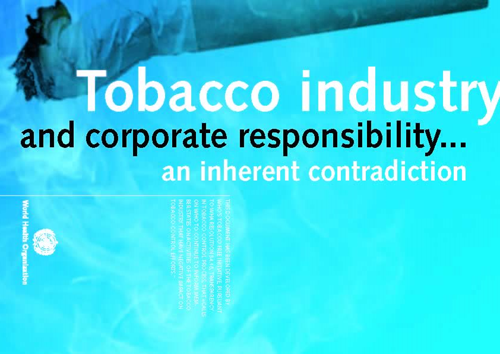Take CSR activities by Tobacco Industry with a pinch of salt
By Simon Mwangi
It is not uncommon for big firms to heavily invest in Corporate Social Responsibility (CSR) activities. The CSR concept has grown tremendously in importance and significance. Firms have become more and more motivated to become socially responsible. The CSR initiatives have often been considered as driven by the moral imperative to undertake activities that are good for society and that enable the individual to act as a good corporate citizen.
However, unhealthy commodities industries such as the tobacco industry use CSR to pass themselves off as socially responsible. The World Health Organization (WHO) defines CSR measures in the context of the tobacco industry as the promotion of “voluntary measures as an effective way to address tobacco control and create an illusion of being a ‘changed’ company and to establish partnerships with health interests”.
From the late 1900s the tobacco industry has strategically used CSR to try and prevent effective government regulation to reduce tobacco consumption. Tobacco companies have attempted to avoid legislative regulation by offering voluntary forms of corporate governance instead. Even though tobacco use is the world’s leading cause of preventable death, the industry continues to use CSR as a means through which to conduct covert marketing.
Tobacco-related deaths are projected to rise to 8.3 million people in 2030 (from 5.4 million in 2005) as the activities of multinational tobacco companies spread the smoking epidemic to developing countries. In places where tobacco companies are not permitted to advertise or promote their products by law, engaging in CSR activities offers an important alternative route to reach various audiences.
According to the guideline to article 5.3 of the World Health Organization (WHO)’s Framework Convention on Tobacco Control (FCTC), the corporate social responsibility by the tobacco industry is, an inherent contradiction, as industry’s core functions are in conflict with the goals of public health policies with respect to tobacco control.
As part of its public relations, CSR and related corporate social investment (CSI) programmes, the tobacco industry has a long history of making philanthropic donations. However, the fundamental issue is that CSR has been used as an effective political strategy by tobacco companies to build support for policy positions that favor tobacco industry interests and to weaken opposition.
At the height of the Covid 19 pandemic, tobacco companies used the situation to promote themselves as pharmaceutical and public health organizations, rather than cigarette manufacturers. Every major tobacco company made donations of either money, food or medical equipment (including ventilators) to COVID-19 relief efforts across the globe. All these efforts were thinly veiled as CSR activities and since countries were in crises, the moves were viewed as being helpful.
Besides the CSR moral dimension, prior studies have also considered, the strategic dimension according to which CSR is a means and an instrument driven by extrinsic motives to achieve a firm’s goals.
Simon Mwangi-Certified Tobacco Industry Monitoring Expert by the Africa Center for Tobacco Industry Monitoring and Policy Research (ATIM).

